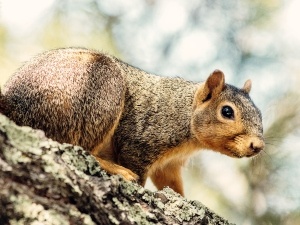
Raising squirrels can be rewarding and enjoyable, that being said, squirrels are living creatures and can be high maintenance. They need the correct diet, a good amount of exercise, and attention in order to live long and healthy lives.
If your pet squirrel suddenly dies you’d be right to be surprised. This article explores why this may have happened
Why did my squirrel suddenly die?
Avoiding predators is one of the main priorities of animals in the wild and in urban areas.
Predators target sick and weak animals. If an animal were to show that it is sick or injured, then it will be attacked more readily than a healthy-looking animal would, this is the same for squirrels.
If a squirrel is sick or injured it will hide any signs of this, it will even hide the signs of illness from you, its caretaker.
You may only realize that your squirrel was ill once it dies. Here are reasons why a squirrel may suddenly die:
Delayed internal bleeding:
If you rescued a baby squirrel from outside, there is no way to tell what happened to the squirrel outside before you rescued it if there are no visible injuries.
If the baby squirrel fell from its mother’s nest, before you took it in, the animal may be suffering from delayed internal bleeding from blunt trauma to the abdomen.
The squirrel will act normally even if it has an injured spleen, kidney, or liver.
If the organs start to fail, they will leak blood and cause the squirrel to become anemic and die of hypovolemic shock.
Incorrect nutrition:
Squirrels will eat almost anything we feed them, but just because they eat anything we feed them doesn’t mean that anything and everything is good for them.
Squirrels have very demanding nutritional needs, if you aren’t giving the squirrel the correct foods then it won’t do well. One nutrient that squirrels need a lot of is calcium.
A lack of calcium is not good for the animal, in addition, giving the squirrel foods that block calcium, (like phosphorous for example) can be bad for the animal as well. It’s good to give squirrels phosphorous but not too much.
Squirrels need double the amount of calcium to phosphorous in their diet.
Feeding your next squirrel a specially made squirrel food will ensure that it gets all the nutrition that it needs.
Poison:
If your squirrel is left to roam around in your garden, or in your neighborhood, then the animal may have been poisoned intentionally or unintentionally.
Someone who doesn’t like squirrels may have poisoned the animal and this could have killed it. Squirrels may also die because they accidentally ate, and were accidentally poisoned, by rat poison left out for rats.
Rat poison works by preventing blood from clotting, this can be fatal.
Both squirrels and rats are rodents and eating poison will have the same effect on both. Eating poison can cause squirrels to die quite quickly.
Disease:
Disease and illness in squirrels aren’t always easily detectable. If a squirrel is sick, you may only realize that the animal was sick after the death of the animal.
There are a variety of diseases that can kill a squirrel, you may only know what exactly killed the animal if you request that a vet do an autopsy on the animal.
Viruses that can kill squirrels include animal distemper (which causes respiratory gastrointestinal, or neurological issues), squirrel pox (which causes tumor-like protrusions on the animal), or rabies (which will change the animal’s behavior).
Squirrels can also get sick from bacteria or parasites, toxoplasmosis is caused by the Toxoplasma gondii parasite, bartonella can be caused by lice, fleas, or ticks and tularemia can be caused by insect bites.
How to tell if a squirrel is dying:
Although squirrels will try their hardest to hide signs that they’re dying, some signs are clear as day and can’t be hidden. Signs of a squirrel dying include:
- Wet discharging scabs around the squirrels eyes, ears, mouth, feet, and genitalia
- Lethargy
- Weakness
- Loss of weight
- Anxiety
If you notice any of the signs mentioned above, you should quickly take the squirrel to the vet for diagnosis and treatment. The vet will assess your squirrel and offer treatment if treatment options are available.
Giving the vet the squirrel’s feeding habits and living conditions will be helpful to them. If you can, take your squirrel to an exotic veterinarian
If you enjoyed this article then you may also be interested in other squirrel related articles. Here are some articles that you may be interested in: Baby Squirrel Pneumonia Symptoms, Baby Squirrel Gasping For Air,


